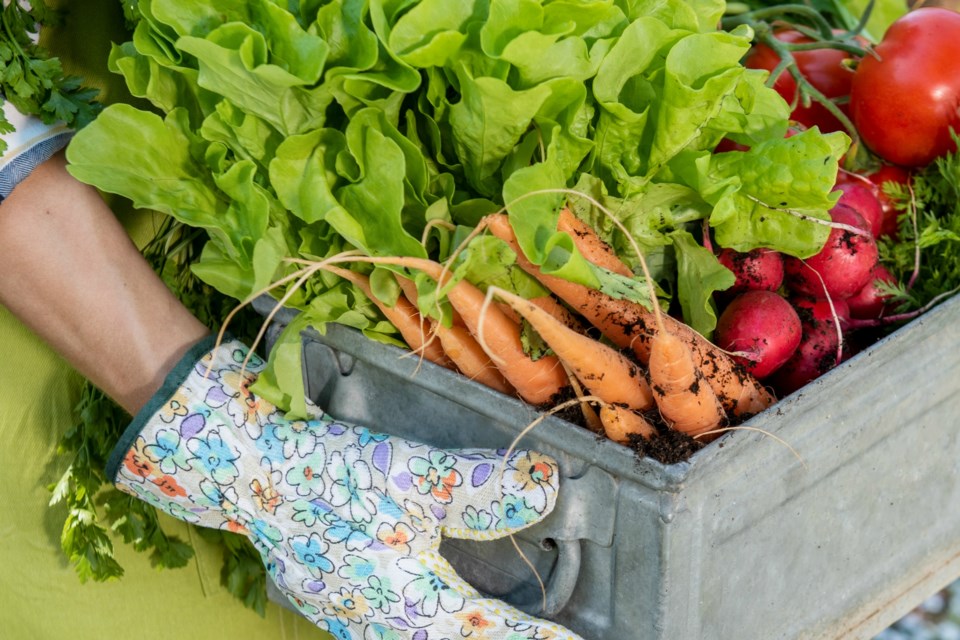COLUMN: Humanity a lot like vibrant vegetable stew – Enjoy

From Midland News
I sometimes wonder what it would be like to be a carrot.They’re such comfortable little people, carrots. So bright and cheerful, and like us, they come in lots of different colours. The most common ones are bright, cheerful and orange, some big, some small and some with eccentric shapes.
As long as their bed is comfy and soft, they go through life being generally happy, comfortable in their skin, accepting of their relationship with the world. I could only wish the same was true for me.
When the time comes for carrots to shuffle off this mortal coil, they go on to nourish other creatures like horses, rabbits and humans. I wonder if they think of themselves as contributing to the greater good?
Then there are many other vegetables, each with its own particular personality.
Onions, for example, I think of as very complicated individuals. They’re a bit guarded — they’re very thin-skinned and take offence at the slightest insult.
Just when you think you understand them, you peel away another layer and a different aspect is brought to light. And, like the village gossip, they love to be the bearer of bad tidings.
Just between us, I believe that deep down, they wish they were more like carrots. Onions can bring tears to the eyes with their tales of personal woe, and they tend to be rather bitter in outlook.
String beans are the fashion models of the vegetable world. Long, slim, toned and svelte, they lose a lot of their attraction as they age.
Fresh off the vine, they are irresistible, but as they grow older, like the rest of us, they become limp and flabby — not in the least appealing. Oh, they look okay in a crowded dish, I suppose, but certainly not the standout performers of their youth.
Potatoes, now, are the sturdy stock whom everyone else depends on. They’re reliable, solid and form the underpinnings of a stable veggie society. When you have a problem, ask a potato.
They may not be too bright, but they’re trustworthy and always steady in a crisis. You can always count on a potato.
Asparagus, on the other hand, are snobs. Slim and elegant, they prefer to associate only with the best people. They inhabit the upper echelons of vegetable society, looking down their noses at everyone else.
They’re the ones whom all the other vegetables love to hate, but everyone secretly wants to be them. Upper crust all the way, asparagus.
And peas. Ah, peas. These little guys are the class clowns. They spend all their time playing tag and hiding. Just when you think you have them under control, they roll away, laughing and giggling, daring you to catch them if you can.
Often you can find them snuggled together in a bunch, hiding under a spinach leaf where they’ve gone to have a nap. They love life and prefer to hang out together, ‘cause no-one else quite gets their odd sense of humour.
Cabbages are the low-rent, other-side-of-the-tracks inhabitants of this vegetable world. They’re all overweight, often owing to poor choices and indifferent upbringing.
They tend to be bitter and hard, and may require sweetening up before being allowed into polite company. Frequently, they can be found bolstering themselves with fermented liquids, but this only makes them even more sour and disillusioned.
On the other side of the coin, we come to eggplants. These guys are the captains of industry. Plump, shiny and smooth, if they were human, they could easily be mistaken for used-car salesmen.
They’re all show, no substance, and when they marry, they generally search out asparagus, since appearance is everything to them.
Two reliable vegetables who have a good deal in common are zucchini and squash. These are the worker bees. They buckle down and get on with the hard jobs while eggplant takes the credit. They’re solid, and like potatoes, dependable. Comfortable sorts, they get along with everyone.
Finally, there’s corn. These guys are the warriors. Tall and strong, they are often solitary. Sometimes they can be very sweet, but in general, they tend to keep to themselves. They’re aloof and self-sufficient, not because they’re unfriendly, but because they don’t have much in common with others. Alone, but not lonely.
Of course, this is just a short list of the most common types. There are so many others, each with its own quirks and eccentricities – mushrooms, for example, are like puppies – fat, soft and cuddly; radishes, sour and unfriendly; garlic, desperate to make friends with everybody.
However, one way or another, like any society, they all manage to get along. A good lesson for us all, don’t you think?
Bev Hanna is a writer and published author. A recovering artist, she now teaches senior writers how to craft compelling stories and memoirs, and manages the Let’s Write group at the Askennonia Senior Centre.
read here









Leave a Reply